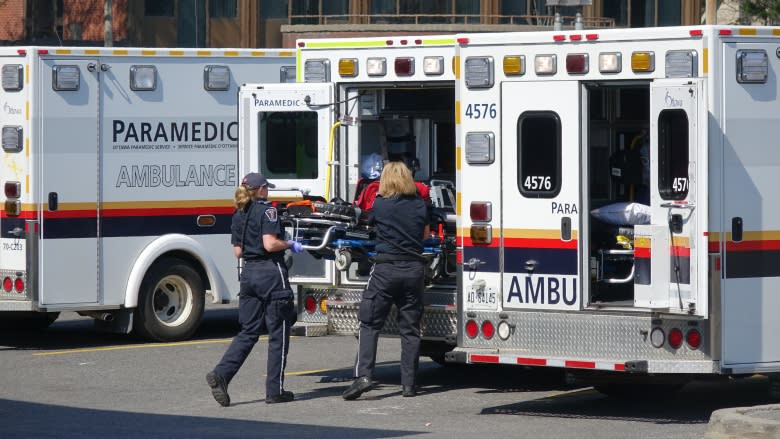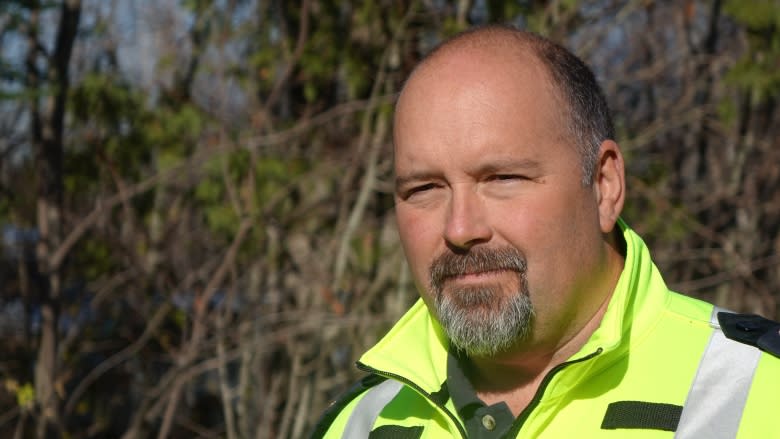Ottawa paramedics changing dispatch practices after ministry directive
The province has directed Ottawa paramedics to change dispatch practices by the end of the week in response to a scathing report that found a systemic problem.
The Ministry of Health and Long-term Care is working with the paramedic service to eliminate two "unique" policies — not seen anywhere else in the province — that led to other municipalities complaining they were being forced to respond to a growing number of Ottawa's emergencies.
The investigation was sparked by a complaint from the chief of Prescott-Russell Emergency Services over one particular day on Aug. 6, 2016, when its crews drove into Ottawa to respond to 13 emergencies.
Ottawa paramedics will no longer have a mandatory 30-minute period after dropping off a patient at a hospital, where they can't respond to another emergency. As well, Ottawa paramedics will no longer be taken out of service in the last 30 minutes of their shift.
The paramedic chief for Renfrew County, Mike Nolan, who has also complained to the province, said these changes will help ease the frustration his crews have felt as they answer calls in Ottawa while seeing Ottawa ambulances parked and not in service.
"Frustration that we have to drive by their own resources for their own residents who have called 911," said Nolan. "But there's also the frustration that we're leaving our own communities uncovered in favour of responding into the city when they chose not to do calls for [themselves]."
'This practice caused significant delays in the return to readiness'
Minister of Health and Long-Term Care Eric Hoskins said he has requested that when Ottawa paramedics arrive at a hospital to drop off a patient, they will no longer have a mandatory 30-minute period where they are not available for another call.
Time is needed to fill out mandatory paperwork, decontaminate the ambulance and replace equipment, but it doesn't in all cases take half an hour to complete, Hoskins said.
The ministry's investigation found that on the night of Aug. 6, 2016, there were 29 calls where patients didn't need serious medical care. Yet it took, on average, 25 minutes before crews told dispatch they were done with their call at the hospital and ready to respond to another call.
"This practice caused significant delays in the return to readiness," the ministry's report reads.
"We all agreed it would be important to change that policy," Hoskins told CBC News. "[Thirty minutes] will be necessary in some situations, but if that offload can occur more quickly and completely there's really no reason why that ambulance and the paramedics shouldn't be available for that call."
End-of-shift policy
Ottawa paramedics are also being asked to change another practice that's different from other Ontario paramedic services, at the end of their work day. If paramedics are back at their home station 30 minutes before their shift ends, they are not dispatched to emergencies, even if other ambulances are busy and can't respond, according to the ministry's findings.
"When you're nearing the end of shift there's a same sort of period where the crew is not available for an urgent call, so we've asked [Ottawa paramedics] to revise that policy as well," said Hoskins.
The City of Ottawa declined CBC's request for an interview.
The city instead forwarded a memo Ottawa's acting paramedic Chief Peter Kelly wrote for the city's mayor and councillors, dated March 1.
The memo confirms the two policy changes will be updated and implemented by Friday.
Paramedic chief releases memo
From the beginning, the city has disputed the damning report. Kelly wrote in the memo that Ottawa paramedics fully cooperated with the ministry throughout the investigation.
As a result of follow-up correspondence, the ministry concluded in a "supplemental report" that on Aug. 6, Ottawa paramedics followed protocol and were "using all the tools available to them to dispatch the closest ambulance based on their regional knowledge, existing local operating policies, directives and paramedic service deployment plans," Kelly wrote.
Lawyer John McLuckie, representing Ottawa paramedics with CUPE Local 503, said the province is aware of the city's deployment plan for ambulances and has known about it for years. The 30-minute period between calls is for infection control and clean up between patients to ensure no one catches an illness, he said.
"For them to suggest that urgent changes are needed to the deployment plan begs the question why were they so happy to approve it over the past number of years," said McLuckie.
The larger problem, according to McLuckie, is that the city is failing to keep pace with calls and population growth.
"Our concern is that the paramedic service should be staffed properly to deal with its call volume and that fundamentally is the concern," he said. "I think the 30-minute thing is where people are focusing on a short-term fix instead of long-term problems."




